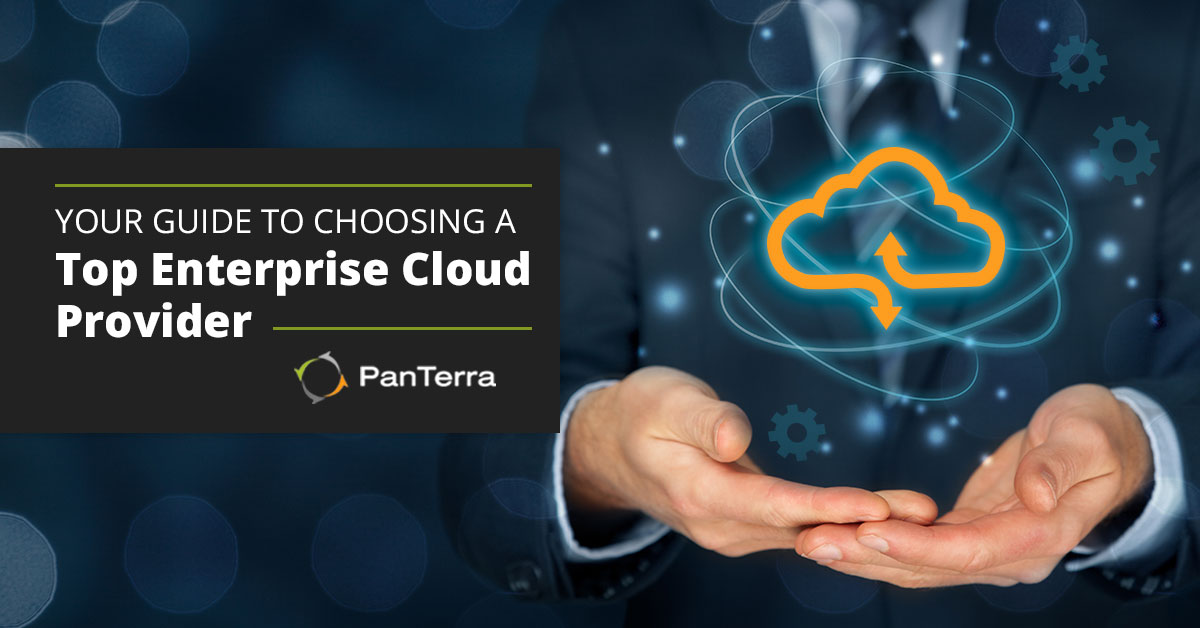Your Guide to Choosing a Top Enterprise Cloud Provider

January 3, 2019

As your organization moves its data and application functions entirely into the cloud, it is critical to choose the right cloud provider to partner with.
Don’t simply ask “What can the cloud can do for my organization?”, but rather, “Can I trust the provider to get the job done all day, everyday”. Not all cloud providers are created equal. Let’s look at 9 things you must consider when choosing the best cloud provider for your organization.
Initial Considerations: Is This a Top Cloud Provider?
Choosing a top, reputable, industry leading cloud provider for your organization is a major decision. Let’s look at a few key considerations for beginning this decision-making process. Ask yourself the following 4 questions to get clarity on what it is your organization truly needs.
#1 How Will We Be Using the Cloud?
The majority of organizations will start their relationship with the cloud by using it as an easily accessible, stable, and secure storage device. Despite this, many providers do not extend their services beyond basic storage so dedicated enterprise IT vendors may be required to meet more advanced needs.
Decide which services your organization needs from a cloud provider and what services are critical. Are you just putting work files up for easy collaboration or do you need advanced features? Think about the long-term and what tools your team will actually adopt and use. A lot of companies have unused feature sets that do nothing but add to your monthly bill.
By doing this initially, you can direct your search to a top cloud provider, capable of meeting your organization’s specific needs.
#2 What Are My Organization's Workload Requirements?
Some companies have relatively low IT requirements over the course of a typical work week. Other organizations, depending largely on size or complexity, may have far more taxing requirements, or needs that fluctuate based on the time of year or projects in the pipeline.
Due to this, the demand for cloud resources may also vary with time and purpose.
Your organization might be involved with data-centric operations that require regulation such as HIPAA or HITRUST. These commonly pertain to privacy, security, and your organization’s ability to be audited.
Or, you might interact with multiple internal and external sources. This would lead to an increase in the amount of data traffic you receive on a regular basis.
Potential cloud providers should cater to the levels of performance, security, and reliability to support the specific workload-specific IT needs of your organization.
#3 What Services Does the Cloud Provider Offer?
Top quality service providers offer a wide range of services, a comprehensive description of each service, the key performance indicators (KPIs), and evaluation of current performance against those indicators.
A cloud provider may have a single service to meet multiple workload types or have multiple services to meet particular needs.
Generally speaking, different services are offered at different prices and can be beneficial for the discriminating business types.
Since you clearly want a top cloud provider and not just any old upstart, here are a few important concepts to explore in a provider’s portfolio as you evaluate your options:
Service Level Agreements:
Make sure to read the fine print. Ask multiple questions about the provider’s service levels and the rights of the customer during certain service conditions such as a data breach, a natural disaster, or a prolonged service outage.
Security:
Determine what steps are taken by the provider to both secure and protect data assets. Also, determine the approximate reaction time of the service provider when it comes to different types of security problems.
Flexibility:
Learn as much as you can about how a potential provider’s cloud service meets changing requirements for the workloads it is expected to support.
Also, depending on your situation, it might be wise to investigate how much special configurations cost.
#4 Is This a Reputable Cloud Provider?
Finally, you want to learn everything you can about the trustworthiness of your potential cloud vendor. Though cloud computing is relatively new, the problems it solves are old. What is the provider’s experience in managing data centers, providing secure hosting, and delivering on application requirements?
In order to do this, try asking a few important questions:
Does this provider have technical expertise and bandwidth to support your business via a quality customer service program?
Is this provider committed to a clear vision and investing appropriately to provide an effective, modern infrastructure or is it a start-up looking to break into a lucrative industry?
Asking the right questions upfront will identify the right cloud provider that can help take your organization to the next level.
Additional Questions to Ask Your Cloud Provider: Make Sure to Check These Boxes!
As you determine which cloud provider(s) you will use, you will want to evaluate the service options that each provides and determine how they will support your unique business characteristics and objectives.
Now that you’ve made your initial question list, let’s take it to the next level and look at 5 more things you need to consider when selecting your cloud services provider.
#5 Help Support
Support is another area that requires very careful consideration. Will your cloud provider be able to provide the support you need quickly and simply?
We’ve all been there before–you need help, but the only support you get is through a chat service or call center. Is this acceptable to you?
It may be, but make sure you ask the right questions up front to clearly communicate what level and form of support you expect and what you will have access to before you select any cloud provider.
#6 Cloud Architecture
As you select a cloud provider, think about how the architecture will be incorporated into your workflows. For example, an organization that relies more on Amazon or Google services may find themselves look to those vendors for ease of integration and consolidation.
You may also want to consider cloud storage architectures when you choose your ideal top cloud provider. The three major players have similar architectures and offer multiple types of storage to fit different needs, but they all have different types of archival storage. If this is important to you, you will want to understand the key differences between them.
#7 Manageability of the Cloud
Next, it is highly recommended to spend some time determining what various cloud platforms require to be effectively managed day to day. Each cloud service provider supports different orchestration tools and integrates with various other services.
If you have services that are particularly vital to your organization, make sure that the cloud provider you choose offers an easy way to integrate them (or that your organization is comfortable porting over to a similar service that is supported). You’ll also want to determine how much time and effort it will take for your team to manage various aspects of the cloud infrastructure before you make a final decision.
#8 Compliance Standards
Next, make sure you choose a cloud architecture platform that can help you meet compliance standards that apply to your industry and organization. Whether it’s HIPAA, PCI DSS, GDPR, or any other framework, make sure you understand what it will take to achieve compliance once your applications and data are living in a public cloud infrastructure.
Be sure you understand where your responsibilities lie, and which aspects of compliance the provider will help you check off.
#9 Costs
And finally, there is cost. There’s no denying that cost will play a big role in deciding which cloud service provider(s) you choose. It’s helpful to look at both sticker price and associated costs.
There are a variety of pricing options out there on the market, which one is right for your organization is up to you. You will need to determine which best fits your business model, timeline, and budget.
PanTerra Gives You All This and More!
Here at PanTerra, we do everything listed above... plus a little more. Our core difference can be broken down into 3 areas: data center, security, and reliability.
Datacenter Difference
PanTerra’s cloud uses redundant data centers and incorporates their state-of-the-art technology to ensure your business continuity. These data centers use 24/7 multi-layer security, Uninterruptible Power Supply (UPS), and generator powered back up and redundant environmental controls (for temperature and humidity).
Our data centers go above and beyond with the following additional features:
- 24/7 Monitoring: surveillance of all data center services and equipment with pro-active notification should any issue arise.
- Strategically Located: located in geographically "stable" locations isolated from earthquakes, hurricanes, tornadoes and other natural disaster events that could affect operations.
- Redundant Connectivity: connections with automated switch-over and 24/7 monitoring ensure continuity even in the event of a carrier outage.
Super-Charged Security
PanTerra’s multi-pronged, enhanced cloud security protects your communications and organization’s content 24/7. We're HIPAA/HITECH compliant, ensure multi-factor authentication on all devices, and implement end-to-end encryption meaning that we offer the highest level of security and protection possible for your organization.
Extreme Reliability
PanTerra delivers the highest level of reliability/availability in the industry.
Over the past 10 years, we have consistently delivered the highest level of availability of any cloud service provider. On top of this, we implement multi-level redundancy at all levels: service, network, etc. We eliminate single points of failure.
Finally, we constantly monitor both data centers and bandwidth carriers around the clock. Due to this, we instantly identify issues impacting service continuity and proactively initiate any necessary actions to ensure business continuity.
As you might have noticed, choosing a top cloud provider is one of the most challenging, but essential decisions you make for your organization. Learn more about how PanTerra’s enterprise cloud is the right fit for your organization’s unique needs in the link below.
.jpg?width=500&height=500&name=Are%20you%20Getting%20a%20Good%20Deal%20(1).jpg)
Comments